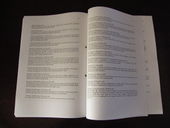Codex Jonathanus
| Codex Jonathanus | |
 A copy of the Codex in Parliament Hall
| |
| Created | 9 August 2014 |
| Ratified | 13 August 2014 |
| Location | Imperial Residence, Austenasia |
| Authors | HIM Emperor Jonathan I |
The Codex Jonathanus (Latin for "The Code of Jonathan") is the civil code of the Empire of Austenasia, and is effectively an abridged version of the sixth century Codex Justinianus. The Codex Jonathanus was created by its namesake, Emperor Jonathan I, between May 2013 and August 2014, and is comprised entirely of edicts and rescripts from classical Roman emperors.
Creation
Work on the Codex Jonathanus began on 6 May 2013, after Jonathan I found an English translation of the Codex Justinianus online and was inspired to adapt it for use in Austenasia. Work on the abridgement took place sporadically for just over a year, until he began to focus spare time on it from early July 2014 onwards. The work was completed on 9 August, and was published as an Imperial Decree on 13 August. It was approved by Parliament later that day, and entered into force on 19 August.
Structure
The Codex Jonathanus consists of 530 laws, originally promulgated by classical Roman emperors between the second and sixth centuries. The earliest was passed by Antoninus Pius in 146 and is concerned with inheritance (although a 223 law on writing wills states that it is based on a law of Claudius I (r. 41 - 54)), and the latest was passed by Justinian I on 23 October 532 and is concerned with property.
Some laws were slightly amended to make them relevant to the contemporary Empire - replacing "senator" with "Representative", "Latin" with "English", etc.
The Codex is comprised of twenty one books:
- Concerning courts and the justice system
- Concerning pacts and contracts
- Concerning debts and creditors
- Concerning guardians
- Concerning marriage and divorce
- Concerning family matters
- Concerning compromises
- Concerning property
- Concerning inheritance
- Concerning deposits
- Concerning rights of religious groups
- Concerning taxes and the Treasury
- Concerning supplications
- Concerning powers of the Monarch
- Concerning the law
- Concerning Representatives
- Concerning Town Councils
- Concerning burial places
- Concerning statues and images
- Concerning Sundays
- Concerning other matters
In an introduction requesting the House of Representatives to authorise the Codex, Emperor Jonathan I states the rationale for why the various laws of the Codex Justinianus were either included or excluded in the Codex Jonathanus:
Many were unsuitable for inclusion due to being concerned with archaic issues irrelevant to the present day, such as slavery, dowries, and the father’s patriarchal control of the family. Some - for example, many of those dealing with inheritance - were not included due to contradicting laws already passed by the Empire of Austenasia on that matter. Others, while originally promulgated in a spirit foreign to the attitudes of today - for example, forbidding Jews to enslave Christians - have been retained due to not actually contradicting in effect any laws or morals held to by the contemporary Empire. Neither were laws included where both a date of their promulgation and the name of the emperor or emperors who passed them could not be found, or where the dates given could not be matched with the emperors alleged to have given the laws (not including obvious typographical mistakes by the translator, which have been corrected and included). Others, such as those concerned with killing in self-defence or with the crimes of theft and robbery, have not been included due to such subjects being covered in much greater detail by Austenasian law already in force.